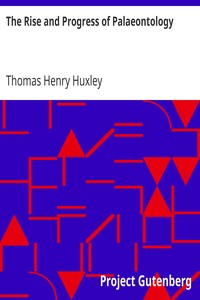| Author |
Huxley, Thomas Henry, 1825-1895 |
| Title |
The Rise and Progress of Palaeontology
Essay #2 from "Science and Hebrew Tradition"
|
| Note |
Reading ease score: 36.4 (College-level). Difficult to read.
|
| Credits |
Produced by D. R. Thompson, and David Widger
|
| Summary |
"The Rise and Progress of Palaeontology" by Thomas Henry Huxley is a scientific publication written in the late 19th century. This book details the development of palaeontology, the study of ancient life through fossil remains, highlighting its historical significance and evolution as a discipline. Huxley, a prominent biologist and a fierce advocate for Darwin's theory of evolution, examines how the understanding of fossils has transformed from antiquity to modern geological science. Through a series of comprehensive discussions, Huxley outlines the significant milestones in palaeontological study, beginning with early observations of fossils and concluding with the establishment of palaeontology's core principles by figures such as Nicolas Steno and Georges Cuvier. He explores the implications of fossil findings on our understanding of Earth's history, species evolution, and the relationships among different life forms. His meticulous approach emphasizes the logical framework of palaeontology, arguing that fossils are organic remains that provide critical evidence of past ecosystems and the gradual change of species over time. Ultimately, Huxley advocates for the theory of evolution, contending that the patterns observed in fossils support the idea of gradual change and adaptation of life on Earth. (This is an automatically generated summary.)
|
| Language |
English |
| LoC Class |
Q: Science
|
| Subject |
Science
|
| Subject |
Evolution
|
| Subject |
Bible and science
|
| Subject |
Paleontology
|
| Category |
Text |
| EBook-No. |
2628 |
| Release Date |
May 1, 2001 |
| Most Recently Updated |
Jan 22, 2013 |
| Copyright Status |
Public domain in the USA. |
| Downloads |
90 downloads in the last 30 days. |
|
Project Gutenberg eBooks are always free!
|

